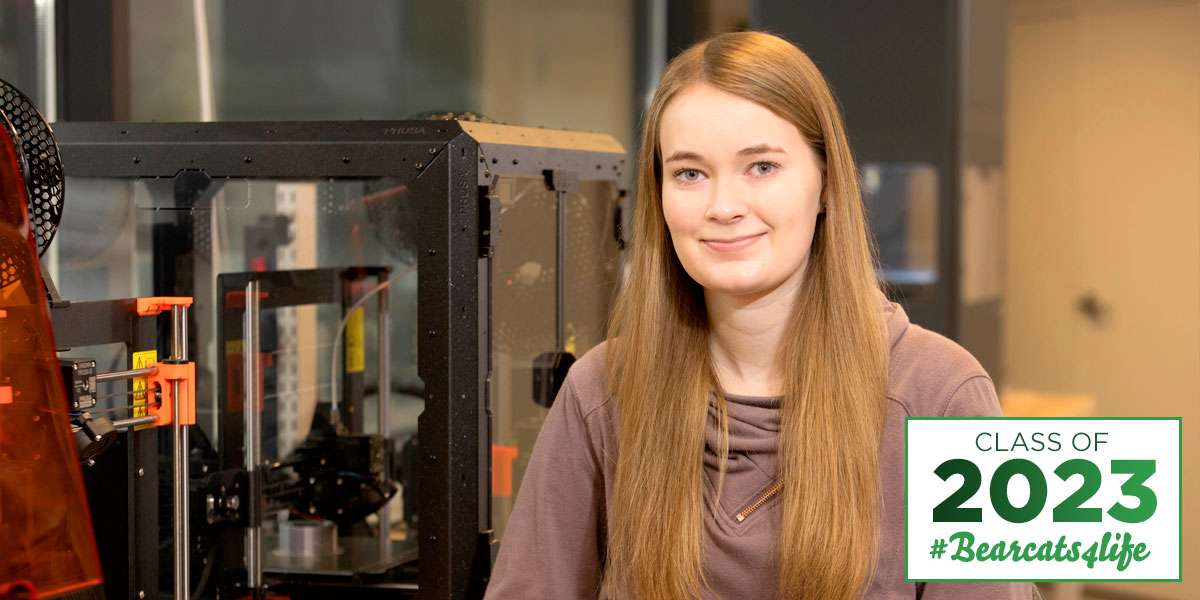Watson grad blends art, mechanical engineering into love for product design
Carrie Hathaway ’22, MS ’23, combined all of her interests and earned two degrees through the 4+1 program

In Carrie Hathaway’s eyes, to be an engineer is to be an artist willingly constrained within the “the real.”
Hathaway ’22, MS ’23, wanted to be a doctor while growing up in Geneseo, N.Y., but instead found a way to combine all of her interests — art, STEM and helping people — into one focus: product design and automation. Now she’s a mechanical engineering major finishing her final year of a 4+1 master’s program at Binghamton University.
“With engineering, I’m most interested in design and manufacturing,” Hathaway said. “I think it’s because sometimes it goes unnoticed. Design is a way to be creative and artistic, but it’s mathematical and still governed by science. A lot of the things I like designing are not things you think about using every day, like light switches or toothbrushes.”
During her years at the Thomas J. Watson College of Engineering and Applied Science, Hathaway has produced the same products she’d like to see widespread across the globe someday. For example, she and her senior project teammates built a CPR device that autonomously administered resuscitation, eliminating the need for EMTs to do it by hand. The following semester, she simulated a blood-pressure sensor that would be attached to a patients’ wrists and continuously monitor their pulse throughout the day, replacing the manual blood pressure cuff.
“So many things we use every day are designed by engineers,” Hathaway said. “I think it’s useful because you’re helping people and designing systems that save lives.”
Hathaway also held an internship at a local software-based pharmaceutical technology company, iA. During summer and fall 2022, she created systems that could reposition pill bottles before they got stuck in their conveyor system.
“The main thing I worked on was a long-term project. … It was basically a conveyor belt that would move pill bottles from one big drum and distribute them through different tubes,” she said. “From the first week I got to design different systems, mainly one that would catch the bottles if they were oriented the wrong way before they jammed up the tube.”
While labs quickly became her second home in her undergraduate years, Hathaway was also active outside of them, serving as president of Pi Tau Sigma, an honorary mechanical engineering society. The group was established to encourage engineers to become more social and well-rounded individuals, as well as to increase students’ interest in departmental activities and the profession. The society invites only the highest-performing juniors and seniors from the mechanical engineering program to join.
“It’s a community for mechanical engineers but not focused on the technical side,” Hathaway said. “It’s trying to unite us because we are very similar-minded, and sometimes we need to step away from math and science and have normal conversations. It’s a reprieve from coursework while still being in the community.”
As president, Hathaway was in charge of planning events throughout the semester to promote community in the department.
“She really was a great president,” said Bruce Murray, a Bartle professor in the Mechanical Engineering Department and faculty advisor to Pi Tau Sigma. “In February we have Engineers Week, and Pi Tau Sigma always handles the egg-drop contest. She organized all of it and she made sure they had all the things the kids needed.”
Engineers Week invites children from the local community to come onto campus and do different experiments to introduce them to STEM in a fun way. During the egg-drop competition, children design a contraption to prevent an egg from breaking when it’s dropped from a two-story balcony. The event gained enough traction that it was extended into a program at schools in the surrounding area, giving engineering students the opportunity to hold the contest and similar events with children in their classrooms as a part of a mentor program.
More recently, Hathaway has been making post-Commencement plans. She has her sights set on working at a toy manufacturing company she grew up walking by in her hometown.
“Everything she did in my courses was exceptional,” Murray said. “Her project reports were advanced, extremely detailed and meticulous. She was a great student and a great person, very pleasant to talk to and helped the department quite a bit during her time. I’m sure she’s going to have a lot of job opportunities available to her, and she’ll do really well as an engineer.”

